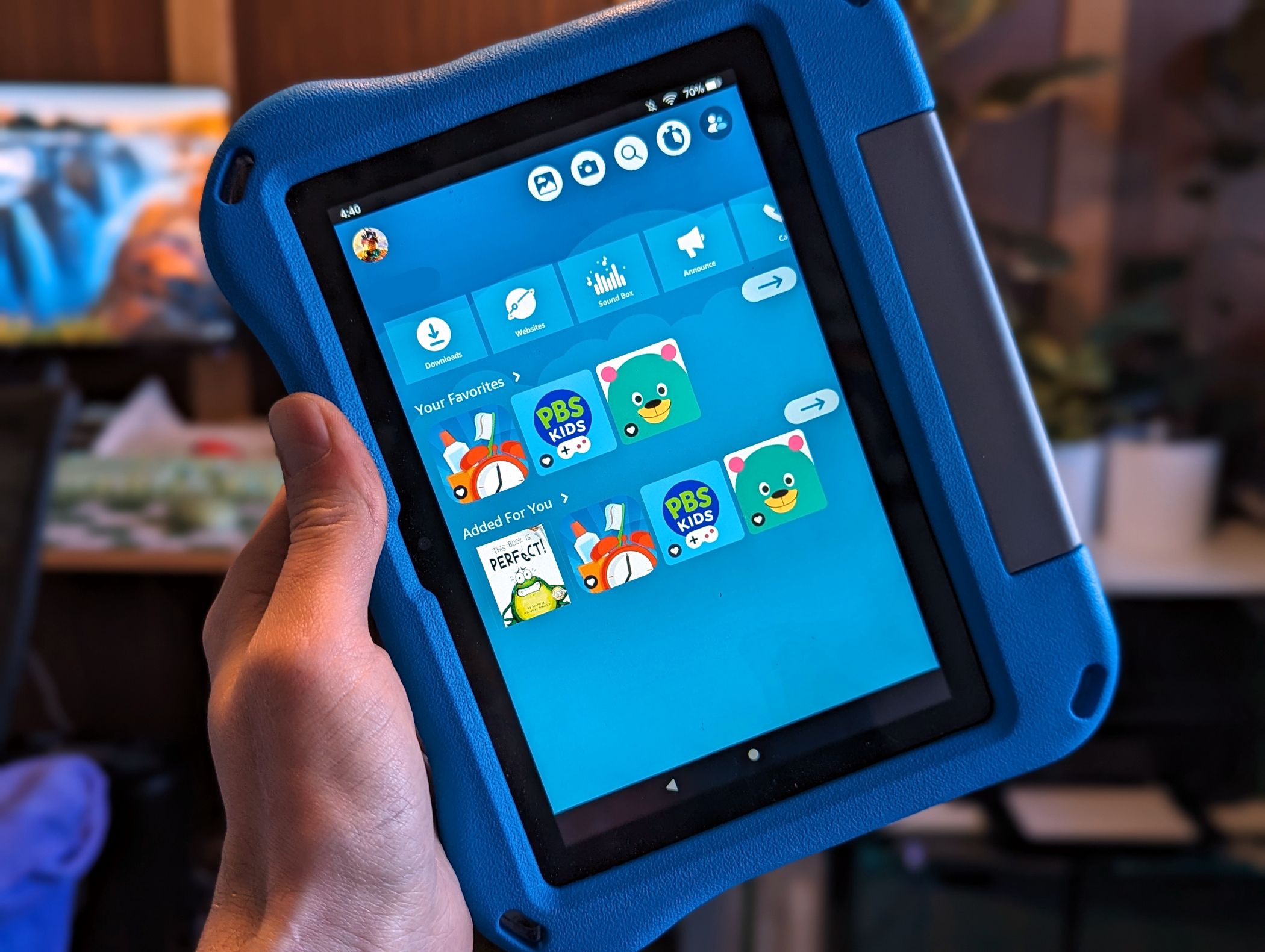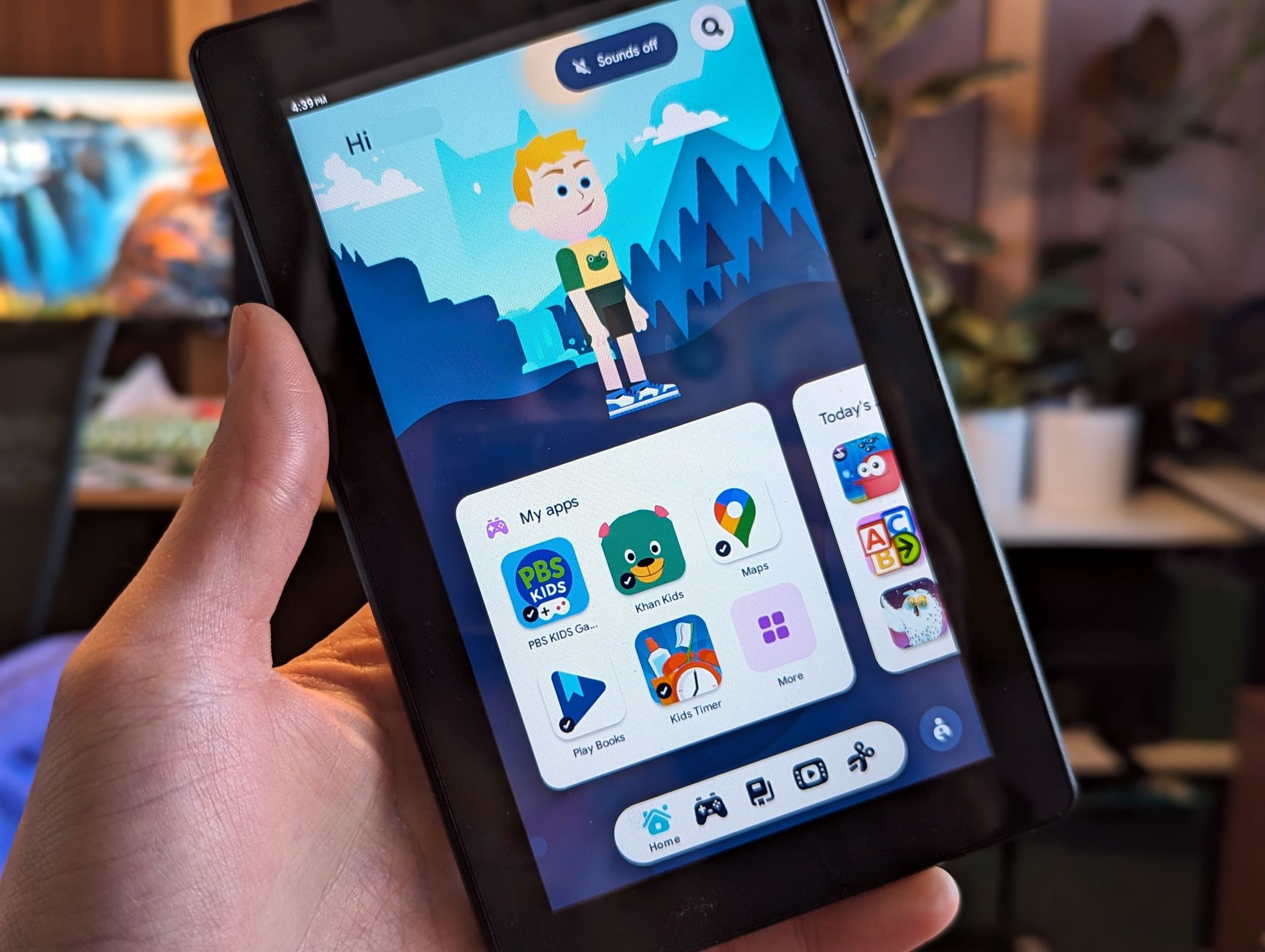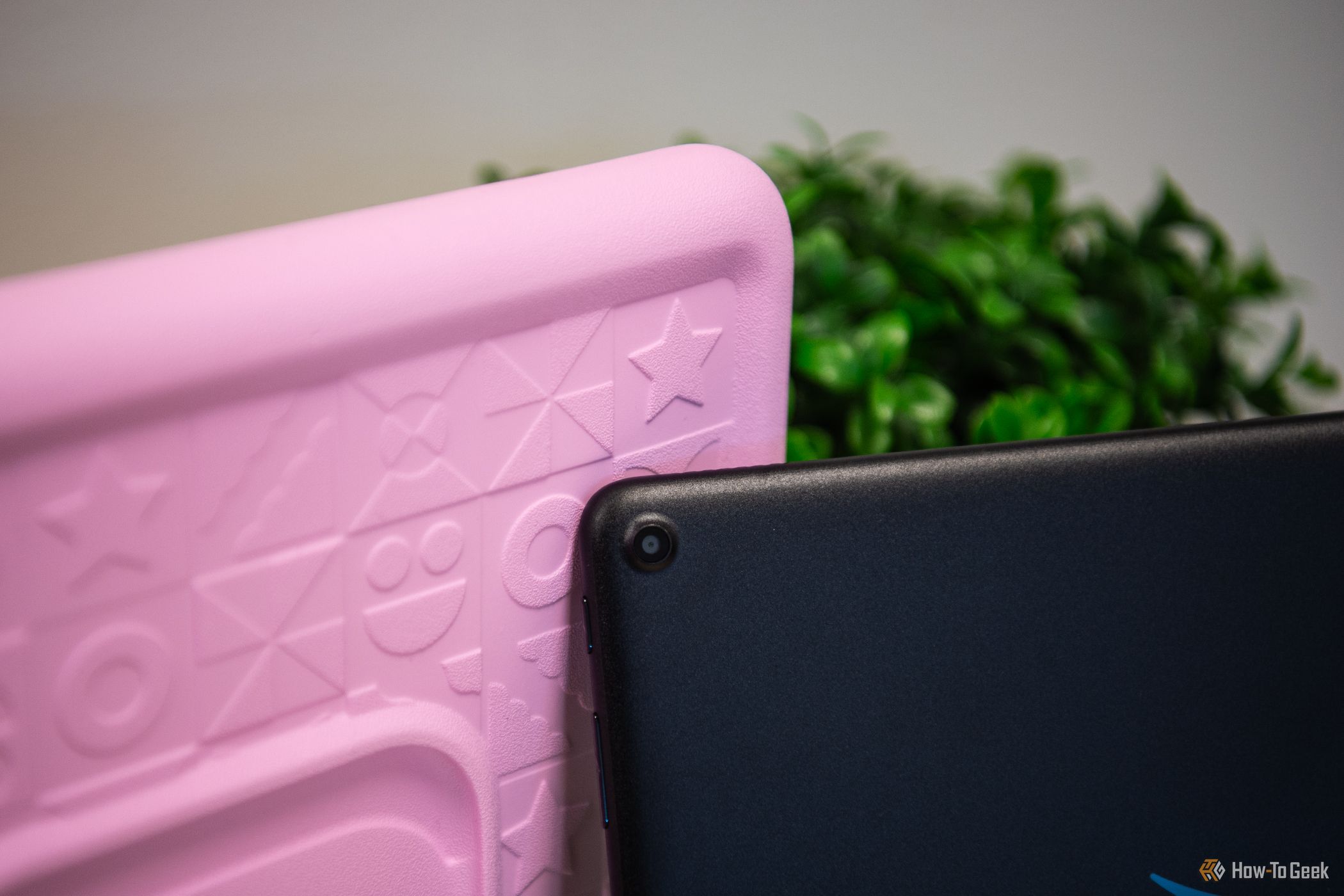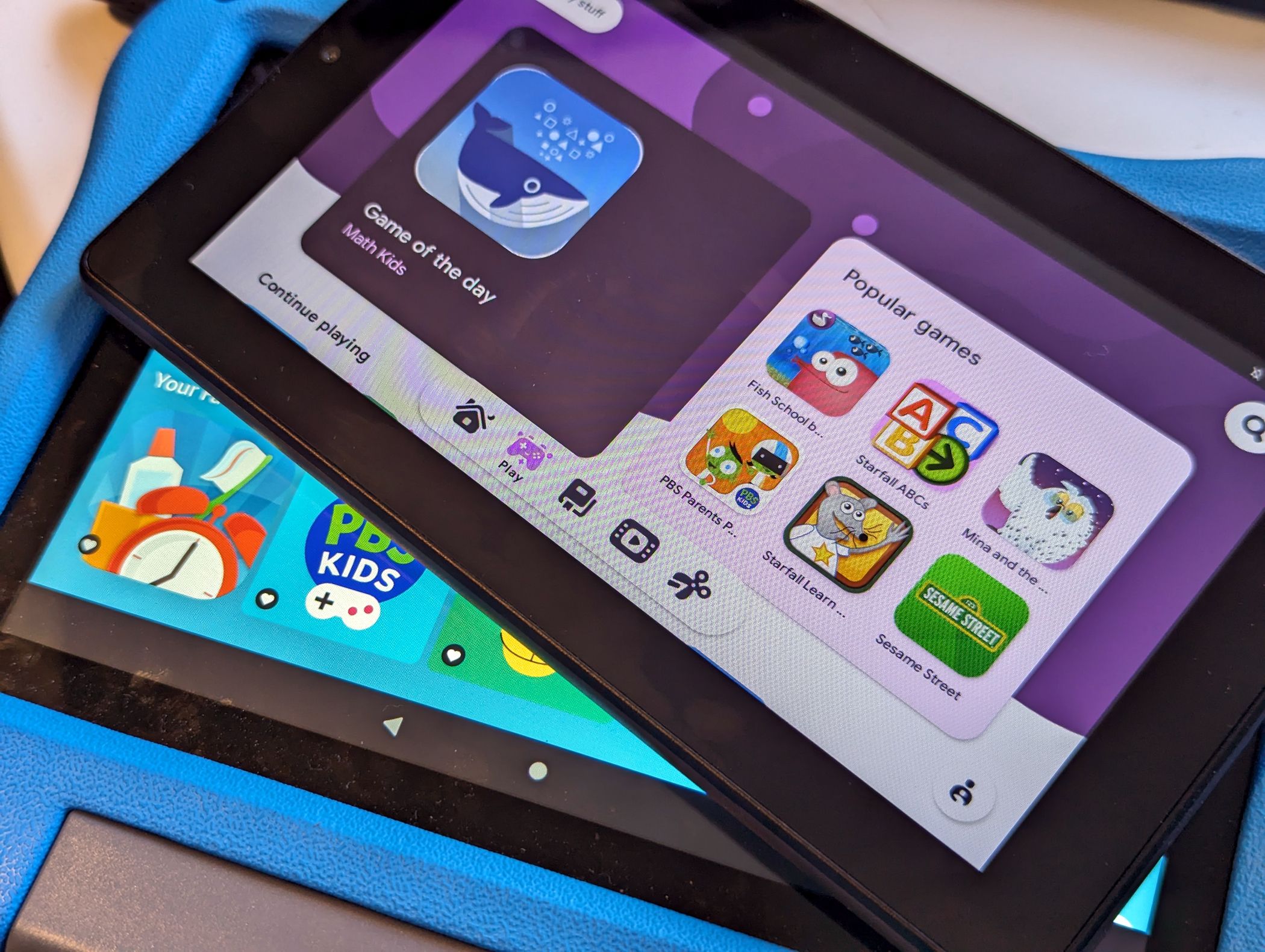Home >Mobile Tutorial >Android Phone >Amazon Kids vs Google Kids Space: Which is Best For Your Child\'s Tablet?
Amazon Kids vs Google Kids Space: Which is Best For Your Child\'s Tablet?
- 王林Original
- 2024-06-19 03:33:393438browse
Handing your child a tablet with unlimited access to apps, games, and the internet at large is not a good idea. However, tablets can be great for kids if used with safeguards in place. That's what both Amazon Kids and Google Kids Space aim to provide, but they do it very differently.
What is Amazon Kids?
Amazon Kids—not to be confused with Amazon Kids+—is a feature that lets you create child profiles on Amazon Fire tablets. It allows you to share selected content from your own library with your kids and set parental controls to limit screen time, filter age-appropriate content, and manage web browsing and content usage. Your kids access everything through a custom home screen, and it can be enabled on any Fire Tablet, not just those marketed as "Kids" models. Amazon Kids requires a child account to be added to your Amazon Household.
An optional $5 per month subscription service called Amazon Kids+ can be added to Amazon Kids accounts. It offers thousands of kid-friendly books, games, videos, music, apps, and Alexa Skills from brands like Disney, Nickelodeon, Marvel, Lego, Sesame Street, and PBS Kids.
What Is Google Kids Space?
Google Kids Space is a tablet experience with a custom home screen and library of quality content aimed at children under 9. It allows kids to customize their experience with unique avatars and receive content recommendations based on their interests, while parents can set boundaries with parental controls accessed through Family Link. Google Kids Space requires a Google Account for your child and a compatible Android device. It includes apps, games, books, and videos that have been approved by teachers and children’s education and media specialists.
Google Kids Space doesn't have an explicitly kid-friendly subscription service option like Amazon Kids+, but it does work with Google Play Pass. When you activate Play Pass for a Kids Space account, it unlocks additional premium content that doesn't have ads or in-app purchases.
What Do Amazon Kids and Google Kids Space Include?
Amazon Kids and Google Kids Space are essentially two sides of the same coin. They both have the same goal in mind: to provide a safe and easy-to-use tablet interface for kids. How they do this is pretty different on the surface, but that core principle is the same.
The first and foremost thing that Amazon Kids and Google Kids Space include is a custom home screen launcher. The home screens are designed to make the interface easy to navigate and surface the apps and content your kids want. Parents can customize the interfaces, but you're generally going to have apps, games, ebooks, and videos to work with.

Amazon Kids includes two interfaces, one for very young kids and one for kids around 6-14. The latter is similar to a regular adult Fire Tablet UI with more restrictions, while the former is extremely simplistic with big icons and very few options. Kids can choose their own profile icons and wallpaper.

Google Kids Space is sort of in the middle of Amazon's two age groups. A large chunk of the home screen is dedicated to a fully customizable avatar. The content is organized into cards, and a toolbar divides the home screen into categories.
Beyond the home screens, Amazon Kids and Google Kids Space offer apps, games, ebooks, videos, and web browsing. There are, of course, many restrictions parents can put on this content. The biggest difference in content is where it comes from. Amazon Kids uses the Amazon App Store, while Google Kids Space uses the Play Store. The Play Store has a larger library of apps, but Amazon is king when it comes to ebooks.
Truthfully, content isn't really the defining feature of either of these services. You will most likely be able to find anything you want on both of them. The key is parental control, so let's talk about that.
What Parental Controls Are Available?

As you would expect, both Amazon Kids and Google Kids Space offer a wide variety of parental controls. However, they're vastly different. Amazon offers a ton of granular control through the Parent Dashboard website—there's no mobile app. Almost everything on the kid's tablet can be controlled here, and the controls are also available on the tablet itself (behind a PIN).
- Time Limits: Lets you set daily limits for different categories like apps, games, videos, and books.
- Bedtime Scheduling: Allows you to set a specific time when the tablet shuts down for the day.
- Learning Goals: You can set educational goals and require your child to complete them before accessing games or entertainment.
- Content Filters: Offers age filters to ensure your child sees content appropriate for their age group. You can also add content from your personal library for more control.
- Store Controls: Allows you to decide if you want your child to be able to download new content, including content with in-app purchases and ads.
Google's parental controls are accessed through Family Link, which is available on the web and mobile apps. It has similar controls as Amazon, with a few additions and exceptions.
- App Limits: Lets you set daily limits for specific apps and games.
- Downtime Scheduling: Allows you to set a specific time when the tablet shuts down for the day.
- Content Restrictions: Offers restrictions for YouTube, Google Chrome, Google Search, Assistant, and Google Photos.
- Store Controls: Allows you to decide if you want your child to be able to download new content, including content with in-app purchases and ads.
The two big differences here are how daily limits are enforced and educational content. Amazon lets you set time limits for apps, audiobooks, ebooks, and videos as categories. Google enables you to actually put time limits for each app individually. This is nice if your kid has productivity apps, like a chore list, that you don't want to be grouped in with games. However, Google does not offer the ability to prioritize educational content before other content can be accessed.

One thing I noticed in comparing the two is that Google Kids Space doesn't lock down the tablet nearly as much. For example, in Amazon Kids, the only thing that can be accessed outside of the home screen is a handful of Android Quick Settings. On Google Kids Space, I can actually still open the Android Settings and mess around with stuff I might not want a kid to access.
However, the worst thing about Google Kids Space is how easy it is for a child to access parental controls. All they have to do is long-press the button in the bottom corner—there's no PIN or any security. Amazon is constantly asking for a PIN (as it should).
Subscriptions & Device Compatibility

As briefly mentioned, Amazon Kids and Google Kids Space both have optional subscription services to enhance the experience.
Amazon Kids+ is $4.99 per month. It includes additional ebooks, movies, TV shows, games, apps, and Alexa Skills. The content has been curated, and it includes brands such as PBS Kids, Disney, Nickelodeon, LEGO, Sesame Street, and Marvel.
Google Kids Space works with Google Play Pass, which is essentially a "Netflix but for Google Play" type service. For kids, it unlocks additional premium content from Google Play that doesn't have ads or in-app purchases. Play Pass is also $4.99 per month.
The story on device compatibility is pretty straightforward. Amazon Kids is available on Amazon Fire tablets, and you don't actually need a special Kids model to use it. Google Kids Space is available on select Android tablets from Lenovo, onn, Google, Nokia, Medion, and Multilaser. You can also attempt to install the app yourself.
Which is Better For Your Child?

So, the natural question is, which one should you choose for your child? Both Amazon and Google have pretty nice offerings, but there are certain advantages of each one.
Amazon Kids is better for kids under 5 years old. The UI is simpler and extremely locked down. I have no worries at all about my son getting into something he shouldn't. In fact, that's another area where Amazon wins: control. You can restrict Amazon Kids much more than you can Google Kids Space.
For example, let's say you really just had one app you wanted your kid to be able to use. That's it. You will have an easier time doing that with Amazon Kids than you would with Google Kids Space. However, the fact that the controls are only available remotely via a browser is annoying. I'd love a Parent Dashboard app.
Google Kids Space is better for kids who are a bit older and have a bit more freedom. The avatar customizer is super fun, and the UI generally looks a lot more modern and clean. You can't turn off as much stuff on Kids Space as you can on Amazon Kids, but you can limit what kind of content is recommended.
If I had to pick an overall winner, it would be Amazon Kids. Amazon has been doing this longer, the parental controls are more granular, and Fire tablets are easier to find. However, Google Kids Space is a worthy competitor for older kids.
The above is the detailed content of Amazon Kids vs Google Kids Space: Which is Best For Your Child\'s Tablet?. For more information, please follow other related articles on the PHP Chinese website!
Related articles
See more- Video editing tutorial with Screen Recorder_Introduction to Video Editing Master
- How to check the income of Alipay Yu'E Bao?
- How to solve the problem that the font size of Baidu Tieba Android version is too small and enable night mode
- Does Yidui Android version support incognito setting_How to set incognito status
- One-click screenshot tutorial: How to take screenshots of Honor Magic5Pro

